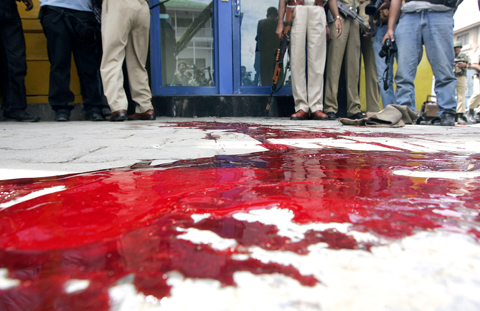The violence in Indian Kashmir has fallen to its lowest level since militants launched a revolt some 20 years ago, officials said yesterday, but warned against complacency.
Killings have dropped to one a day, from 10 daily in 2001 and a peak of 13 in 1996, when the insurgency against Indian rule was at its high with daily bomb attacks and gunbattles, official police records in Kashmir showed.
“The militant violence has fallen to an all-time low,” a police officer said, requesting not to be named because he was not authorized to talk to the media.

PHOTO: REUTERS
He said during the first seven months of this year, an estimated 195 people — 113 militants, 45 civilians and 37 security personnel — were killed in the region.
“For the first time since 1989, the daily death toll has dropped to one,” the officer said, referring to the year when the separatist revolt began in the Muslim-majority Himalayan region.
The levels of violence dipped after India and Pakistan, whose territorial dispute over Kashmir has triggered two wars, embarked on a peace process in 2004.
Indian officials also attribute the drop to India’s fencing of the border between the two countries and what they say are more effective counter-insurgency tactics.
The insurgency has left more than 47,000 people dead, official figures show. Human rights groups put the toll at 70,000 dead and disappeared.
Despite the easing of violence, Indian Kashmir’s senior minister Ali Mohammed Sagar opposed any reduction in troop levels in the state, a key demand of main opposition Peoples Democratic Party.
He warned that it was not wise to “lower our guard as some incidents [of violence] were still taking place.”

Chinese authorities said they began live-fire exercises in the Gulf of Tonkin on Monday, only days after Vietnam announced a new line marking what it considers its territory in the body of water between the nations. The Chinese Maritime Safety Administration said the exercises would be focused on the Beibu Gulf area, closer to the Chinese side of the Gulf of Tonkin, and would run until tomorrow evening. It gave no further details, but the drills follow an announcement last week by Vietnam establishing a baseline used to calculate the width of its territorial waters in the Gulf of Tonkin. State-run Vietnam News

‘UNUSUAL EVENT’: The Australian defense minister said that the Chinese navy task group was entitled to be where it was, but Australia would be watching it closely The Australian and New Zealand militaries were monitoring three Chinese warships moving unusually far south along Australia’s east coast on an unknown mission, officials said yesterday. The Australian government a week ago said that the warships had traveled through Southeast Asia and the Coral Sea, and were approaching northeast Australia. Australian Minister for Defence Richard Marles yesterday said that the Chinese ships — the Hengyang naval frigate, the Zunyi cruiser and the Weishanhu replenishment vessel — were “off the east coast of Australia.” Defense officials did not respond to a request for comment on a Financial Times report that the task group from

Four decades after they were forced apart, US-raised Adamary Garcia and her birth mother on Saturday fell into each other’s arms at the airport in Santiago, Chile. Without speaking, they embraced tearfully: A rare reunification for one the thousands of Chileans taken from their mothers as babies and given up for adoption abroad. “The worst is over,” Edita Bizama, 64, said as she beheld her daughter for the first time since her birth 41 years ago. Garcia had flown to Santiago with four other women born in Chile and adopted in the US. Reports have estimated there were 20,000 such cases from 1950 to

DEFENSE UPHEAVAL: Trump was also to remove the first woman to lead a military service, as well as the judge advocates general for the army, navy and air force US President Donald Trump on Friday fired the chairman of the Joint Chiefs of Staff, Air Force General C.Q. Brown, and pushed out five other admirals and generals in an unprecedented shake-up of US military leadership. Trump wrote in a post on Truth Social that he would nominate former lieutenant general Dan “Razin” Caine to succeed Brown, breaking with tradition by pulling someone out of retirement for the first time to become the top military officer. The president would also replace the head of the US Navy, a position held by Admiral Lisa Franchetti, the first woman to lead a military service,